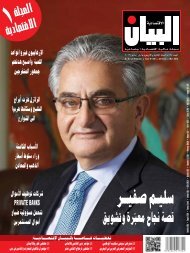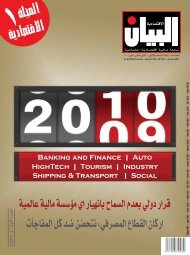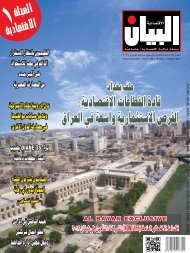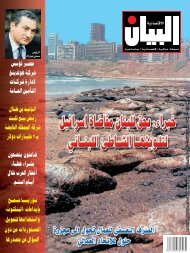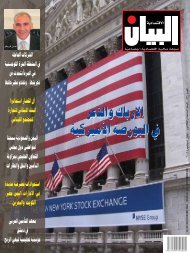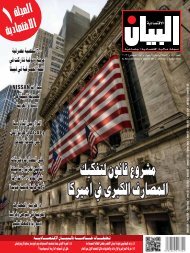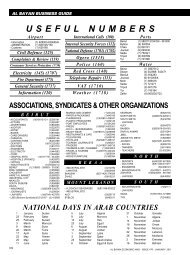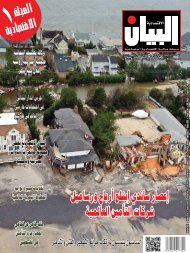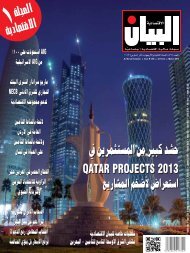Oðüà b'G äÃÃãdGh ƪæâd ±hô¶dG - Al Bayan Magazine
Oðüà b'G äÃÃãdGh ƪæâd ±hô¶dG - Al Bayan Magazine
Oðüà b'G äÃÃãdGh ƪæâd ±hô¶dG - Al Bayan Magazine
You also want an ePaper? Increase the reach of your titles
YUMPU automatically turns print PDFs into web optimized ePapers that Google loves.
اقتصاد عربي وعالمي<br />
منتى الاقتصاد العالمي - WEF الاردن<br />
MARTIN SENN (GROUP CEO - ZURICH):<br />
Insurance plays an important economic and<br />
social role in risk pooling and risk management<br />
<strong>Al</strong> <strong>Bayan</strong> <strong>Magazine</strong> met the Group CEO of Zurich Insurance Group, Martin<br />
Senn, who talked about the purpose behind their participation in the World<br />
Economic Forum. He also discussed, with our correspondent, his thoughts on<br />
how the Middle East & North Africa region can attain sustainable economic<br />
growth and stability, generate youth unemployment and diversify their<br />
economies. Senn also talked about how the insurance industry can play a key role<br />
in helping the MENA region to achieve these social and economic objectives.<br />
Below is the account of the interview.<br />
* What is the purpose behind your participation<br />
in WEF?<br />
- It is important to be here to get in-depth<br />
insights into the region’s economic, political<br />
and social issues and challenges, as well as a<br />
deeper understanding of the region’s potential<br />
and opportunities. In my function as a co-chair,<br />
I will support the WEF in its activities by participating<br />
in different forums where we bring<br />
together opinion leaders, business leaders,<br />
political leaders and social leaders to discuss<br />
the challenges and opportunities – and also<br />
how we can overcome these challenges and<br />
realize the region’s potential . In addition, in<br />
my personal participation as a Swiss national<br />
based in Zurich, I will also provide an outsider’s<br />
view of the region in the various forums<br />
and panel debates that I will be speaking and<br />
debating in.<br />
* In your opinion, what is needed in the Arab World to create the conditions<br />
required for economic growth and stability?<br />
- First of all, the Arab World and the MENA region are not homogeneous. They are<br />
very heterogeneous; a one-size-fits all approach would not work here. One of the<br />
biggest challenges facing the region is how to create more economic dynamism and<br />
diversification to generate greater employment opportunities, especially for the<br />
youth of the region. This can be achieved by promoting and supporting new sectors<br />
such as renewable energy, or invigorating existing sectors like tourism or manufacturing.<br />
The region should also look at improving the skills of the workforce to meet<br />
the needs of these industries. Not just educational training, but vocational training<br />
too – like the successful apprenticeship programs in Germany, for instance. I would<br />
like to see women given greater opportunities in the job market as they are an<br />
underdeveloped resource across the region. More women in the workforce would<br />
also boost economic growth. In addition, there should be a common understanding<br />
and support between the rule of law, regulations, and a more positive interaction<br />
between the private and public sectors.<br />
* What is the role of insurance in the Middle East?<br />
- The role of insurance in emerging economies is often not well understood and<br />
underestimated. Insurance can promote economic development, create jobs and<br />
boost trade across the MENA region. Insurance can help to transform the MENA<br />
economies to address many of the economic and social challenges facing the<br />
region, including helping nations to diversify and modernize their economies to create<br />
sufficient employment opportunities for the young.<br />
For fast growing countries in MENA, insurance supports the pace of economic<br />
development and protects quality of life. It safeguards and rebuilds the foundations<br />
of economic activity after unexpected loss, like in the wake of natural catastrophes.<br />
Insurance can also play an important part in funding retirement solutions. It not only<br />
provides long-term savings vehicles, but also addresses risks that might affect the<br />
ability to save (i.e. disability) or living longer than expected (i.e. longevity risk) on<br />
one’s savings. In addition, given the long-term nature of their liabilities, insurers are<br />
ideally suited to provide finance for growth enhancing long-term investments.”<br />
* Why do you think insurance is under penetrated?<br />
- Despite the potential benefits of insurance, the industry is still in its infancy and<br />
both penetration and density are low in the region compared to other global emerging<br />
markets. This can partly be explained by cultural and religious factors that influence<br />
insurance-buying behavior. Beyond that, trust in insurance is lacking, and<br />
there is only a rather limited awareness of the benefits it offers. Furthermore, for<br />
large segments of the population, insurance is often unaffordable. In addition significant<br />
regulatory and public-related hurdles have hindered the development of a<br />
strong and competitive insurance segment.<br />
* What is your strategy in the MENA region?<br />
From Right: Martin Senn, Emile Zakhour,<br />
Saad Mered & Sean Mcallister<br />
- We are looking to expand our footprint and<br />
grow our business base globally. Diversification<br />
is one of the key principles in any sort of risk<br />
management approach. This region has 350<br />
million people and positive economic and demographic<br />
dynamics, which provides a great<br />
opportunity for Zurich to build exciting new businesses<br />
and diversify. This part of the world is still<br />
growing, may be slower than before, but it is still<br />
in a period of growth and so it remains an attractive<br />
region for Zurich – alongside other emerging<br />
markets such as Latin America, South Africa,<br />
North East Asia and South East Asia. In the<br />
MENA region we have a presence in Morocco<br />
and six Middle Eastern countries – Bahrain,<br />
Kuwait, Lebanon, Oman, Qatar and the United<br />
Arab Emirates. We are growing our businesses<br />
in each of these markets. We currently have no<br />
presence in Saudi Arabia, but we are assessing<br />
our options in this important regional economy.<br />
* What is the added value that Zurich gave to the MENA region?<br />
- The MENA region is growing and maturing and its markets our undergoing dynamic<br />
changes, which require sophisticated insurance solutions. We feel Zurich’s<br />
expertise and experience is key to providing these insurance solutions. Our aim is<br />
to provide meaningful solutions to complex risk management demands of our customers<br />
worldwide. We help them understand the risks that their businesses face,<br />
and help them manage and mitigate those risks to ensure their business can continue<br />
operation in the event of any adverse incident.<br />
As a global insurer, we offer a broad portfolio of products, capabilities and relevant<br />
solutions for our customers, offering expertise in many industries that is not widely<br />
available in the region. There is also a strong need from companies in the MENA<br />
region for an insurer that can provide greater capabilities, resources and expertise.<br />
As a global insurer, we are in a unique position to fulfill these underserved needs<br />
and exploit our strengths in the market.<br />
* It is true that you are dumping prices to take market share away from competitors?<br />
- We have a very disciplined approach in the way we write business. If we are gaining<br />
market share it is on the back of our technical pricing and not because we are<br />
trying to undercut the competition. Companies that only compete on price do not<br />
have a sustainable business model, because when you dump price - you buy risk.<br />
If you lower your prices to unacceptable levels then in the future you will not be able<br />
to cover any losses due to an accident or natural catastrophe - let alone make a<br />
profit. At Zurich, we do not compete on price. Our strategy is defined by who we are,<br />
what we do, and how we do it. We want to increase our core insurance business by<br />
providing excellent customer service and products.<br />
* Are you satisfied with your results in the MENA?<br />
- We have a very strong general insurance business in Morocco that for many years has<br />
been growing at a pace faster than the market rate, yet continues to produce attractive<br />
returns. In the Middle East, our general insurance business is still very young and it is<br />
growing at an incredible rate. We still plan to continue to expand our distribution network,<br />
product portfolio and service capabilities in the region, but I am very pleased with the<br />
progress of the business. And, of course, we have a very mature life business in the<br />
Middle East – covering the UAE, Qatar and Bahrain. It has been in the region for over 25<br />
years and is the strongest life insurance brand in the region.<br />
* Any last message?<br />
- MENA is a region of potential and opportunity. Of course, it faces some tough political,<br />
social and economic issues and challenges – as most emerging regions do.<br />
But I prefer to focus on the positive aspects of the region and this is why Zurich<br />
chose to invest in MENA. I also believe Zurich, and the entire insurance industry,<br />
can play a role to help the region fulfill its potential by promoting economic development,<br />
creating jobs and boosting trade.<br />
٦١ AL BAYAN ECONOMIC MAG - ISSUE 500 - AUGUST 2013







